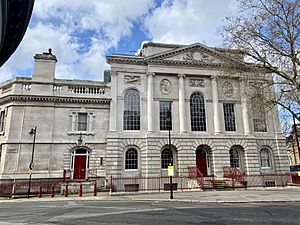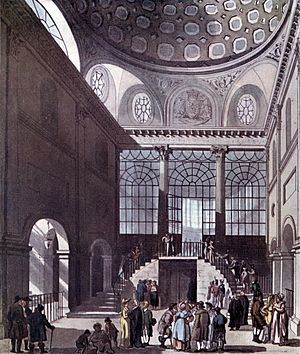Middlesex Sessions House facts for kids
Quick facts for kids Middlesex Sessions House |
|
|---|---|

Middlesex Sessions House
|
|
| Location | London |
| Built | 1782 |
| Architect | Thomas Rogers |
| Architectural style(s) | Classical style |
|
Listed Building – Grade II*
|
|
| Official name: Clerkenwell Conference Centre | |
| Designated | 29 December 1950 |
| Reference no. | 1298072 |
| Lua error in Module:Location_map at line 420: attempt to index field 'wikibase' (a nil value). | |
The Old Sessions House is a big, historic building in London, England. It's located on Clerkenwell Green in the London Borough of Islington. This building was finished in 1780. It used to be a courthouse for important legal meetings called the Middlesex Quarter Sessions. Today, it's a special building known as a Grade II* listed building, meaning it's protected because of its history and design.
Contents
A Look at the Old Sessions House's History

Why a New Courthouse Was Built
The Old Sessions House was built to replace an older courthouse called Hicks Hall. Hicks Hall had been used since 1612. It handled many smaller legal cases that the main court, the Old Bailey, didn't deal with. Hicks Hall was taken down in 1782 to make way for this new, bigger building.
Serving as a Center for Law
The famous architect Thomas Rogers designed the Old Sessions House. He used the classical style, which means it looks like ancient Greek or Roman buildings. It was completed in 1782. For many years, this building was the main place for legal and administrative matters in Middlesex.
However, things changed in 1889. New local governments, called county councils, were created. These included the Middlesex and London councils. Because the Old Sessions House was now in the area of the London County Council, the Middlesex leaders didn't need it anymore. Their administrative work moved to the Guildhall in Parliament Square.
The London County Council took over the building. They used it for a while for local courts. But by 1921, all remaining court business moved to another building in Newington Causeway.
New Uses for an Old Building
After its time as a courthouse, the Old Sessions House found new purposes. From 1931 to 1973, it became the main office for Avery Weighing Machines. This company made weighing scales.
After Avery Weighing Machines left, the building started to fall apart. But in 1978, a group called a masonic trust bought it. They fixed it up and opened it in 1979 as the London Masonic Centre. It was used for meetings and social events.
Later, in 2014, two people named Oliver and Ted Grebelius bought the building. They turned it into a modern restaurant and bar. So, this historic building continues to be used and enjoyed today.
The Building's Amazing Design
The Old Sessions House is much larger than the old Hicks Hall. It was built in the grand classical style.
Key Architectural Features
- Columns and Pediment: The front of the building has four huge Ionic order columns. These columns support a triangular top part called a pediment. This design makes the building look very important and strong.
- Imperial Grandeur: Unlike older, simpler courthouses, Thomas Rogers designed the Old Sessions House to look very grand. It has impressive sizes and decorations.
- Later Changes: In 1860, the building was made even bigger and changed on all sides except the main front. This work was done by Frederick Hyde Pownall.
- Royal Carving: Above the central window, there was a special carving. It showed the head of King George III. This carving was made by two sculptors, John Charles Felix Rossi and Giovanni Battista Locatelli.
- Dome: The entrance hall and staircase inside the building are covered by a large dome. This dome is a copy of the famous dome of the Pantheon in Rome, an ancient Roman temple.
 | William L. Dawson |
 | W. E. B. Du Bois |
 | Harry Belafonte |

